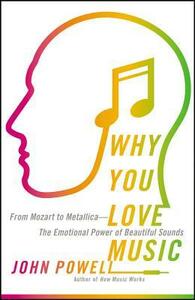Take a photo of a barcode or cover
16 reviews for:
Why You Love Music: From Mozart to Metallica--The Emotional Power of Beautiful Sounds
John Powell
16 reviews for:
Why You Love Music: From Mozart to Metallica--The Emotional Power of Beautiful Sounds
John Powell
informative
lighthearted
medium-paced
informative
medium-paced
Not all heroes wear capes, some just have great curls like John Powell.
I absolutely love music, but I’m not a musician. Most of [b:Why You Love Music: From Mozart to Metallica--The Emotional Power of Beautiful Sounds|27161812|Why You Love Music From Mozart to Metallica--The Emotional Power of Beautiful Sounds|John Powell|https://i.gr-assets.com/images/S/compressed.photo.goodreads.com/books/1451861618l/27161812._SY75_.jpg|47201092] was fascinating, but there were a few chapters that went completely over my head.
Excellent‚ fascinating read. Interesting slants on stuff I already knew and lots of stuff I didn't know. Enough to make me immediately get his previous book 'How Music Works'.
I learned a bit from this book, but the writing style was sort of flippant. Maybe if I was a musician I would appreciate it more.
In this non-fiction book, John Powell explains the physics behind music, and all the things that tug at our heartstrings when we hear particular songs. We learn how music can influence our emotions, and how our brain is an absolutely unbelievably wonderful thing for being able to understand music at all. We learn that hearing our car turn signal going "tick-tock" is an illusion, and I am now obsessed with this.
It is in parts a bit of a dry subject (learning about scales, octaves, hertz and relative frequencies), but Powell inserts shots of humour regularly throughout his writing, so it's never terrible to read. I never felt like giving up on it (though full disclosure, I did not read the annexes).
Plus he introduced me to this wonderful bird, so 5 stars just to that video!
It is in parts a bit of a dry subject (learning about scales, octaves, hertz and relative frequencies), but Powell inserts shots of humour regularly throughout his writing, so it's never terrible to read. I never felt like giving up on it (though full disclosure, I did not read the annexes).
Plus he introduced me to this wonderful bird, so 5 stars just to that video!
Pretty neat book covering music as a topic. One problem I have with psych stuff is that sometimes stuff I learn feels so intuitive that I'm not sure if I'm really picking up on anything novel.
I did skip the fiddly more technical bits toward the end.
I did skip the fiddly more technical bits toward the end.
funny
informative
lighthearted
reflective
fast-paced
informative
slow-paced
The parts about the science of sound or theory are a bit dry, but the psychology piece really is an interesting read. Complex things are explained in a very palatable way and that British wit makes everything just that much more engaging.





